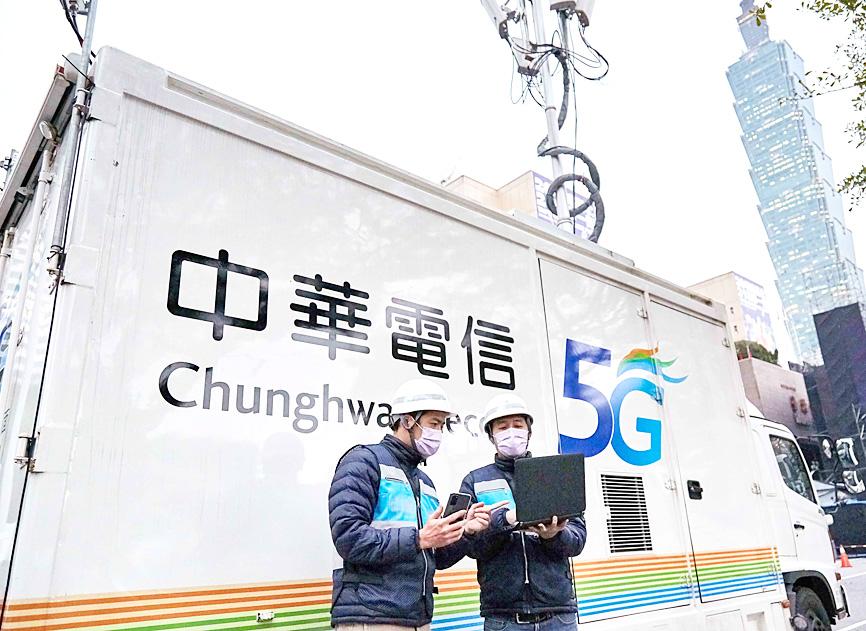Chunghwa Telecom Co (中華電信) has signed an agreement to participate in a multilateral project to lay an undersea cable connecting several countries in Asia in a bid to increase its international presence, the company announced yesterday.
The 12,000km-long Apricot subsea cable system that is to feature state-of-the-art transmission technology would connect Taiwan, Japan, Singapore, Indonesia, the Philippines and Guam, the company said.
Scheduled to be launched in 2024, the Apricot cable system would have a capacity of more than 190 terabits per second to meet growing demand for access to 5G mobile broadband networks, the Internet of Things, artificial intelligence, virtual reality, cloud services and videoconferencing.

Photo courtesy of Chunghwa Telecom Co
The high-capacity undersea cable would bring high-speed, reliable Internet to Taiwan as it enters the 5G era, and is expected to lay the cornerstone for advancing Chunghwa Telecom’s cross-border telecom cooperation in the Asia-Pacific region and enhance Taiwan’s status in the region.
To improve Taiwan’s global Internet security, Chunghwa Telecom has been bolstering its links with neighboring countries and important telecom markets in the region by participating in several international undersea cable projects.
It has invested in the construction of the Asia-Pacific Gateway (APG) and the New Cross Pacific submarine cable networks, which are both landed at Yilan County’s Toucheng Township (頭城).
It is also participating in the construction of the Southeast Asia-Japan 2 (SJC2) undersea cable from New Taipei City’s Tamsui District (淡水) and Pingtung County’s Fangshan Township (枋山) to enhance Taiwan’s national network security. The SJC2 cable is expected to be completed next year.
The Apricot cable features a new router that could link with the APG and SJC2 cables through routers in Hong Kong, Vietnam and Thailand, and form a more comprehensive international undersea network in Southeast Asia, said Wu Hsueh-lan (吳學蘭), president of Chunghwa Telecom’s international business group.
Alphabet Inc’s Google and Facebook Inc yesterday announced their participation in the construction of the Apricot subsea cable, which is set to enhance the flexibility of their digital services and improve Internet connectivity across the Asia-Pacific region.
Apricot is Google’s latest investment in the global submarine cable area. The company has invested in 18 undersea cables, 27 cloud regions and 82 cloud zones.
Facebook in March announced two new trans-Pacific subsea cables connecting Singapore to the US west coast — Bifrost and Echo — with Google participating in the latter.
Google said in a blog post that the Echo and Apricot cables are complementary submarine systems, and would improve the resilience of Google Cloud and the company’s other digital services.
Additional reporting by Bloomberg

When an apartment comes up for rent in Germany’s big cities, hundreds of prospective tenants often queue down the street to view it, but the acute shortage of affordable housing is getting scant attention ahead of today’s snap general election. “Housing is one of the main problems for people, but nobody talks about it, nobody takes it seriously,” said Andreas Ibel, president of Build Europe, an association representing housing developers. Migration and the sluggish economy top the list of voters’ concerns, but analysts say housing policy fails to break through as returns on investment take time to register, making the

EARLY TALKS: Measures under consideration include convincing allies to match US curbs, further restricting exports of AI chips or GPUs, and blocking Chinese investments US President Donald Trump’s administration is sketching out tougher versions of US semiconductor curbs and pressuring key allies to escalate their restrictions on China’s chip industry, an early indication the new US president plans to expand efforts that began under former US president Joe Biden to limit Beijing’s technological prowess. Trump officials recently met with their Japanese and Dutch counterparts about restricting Tokyo Electron Ltd and ASML Holding NV engineers from maintaining semiconductor gear in China, people familiar with the matter said. The aim, which was also a priority for Biden, is to see key allies match China curbs the US

NOT TO WORRY: Some people are concerned funds might continue moving out of the country, but the central bank said financial account outflows are not unusual in Taiwan Taiwan’s outbound investments hit a new high last year due to investments made by contract chipmaker Taiwan Semiconductor Manufacturing Co (TSMC, 台積電) and other major manufacturers to boost global expansion, the central bank said on Thursday. The net increase in outbound investments last year reached a record US$21.05 billion, while the net increase in outbound investments by Taiwanese residents reached a record US$31.98 billion, central bank data showed. Chen Fei-wen (陳斐紋), deputy director of the central bank’s Department of Economic Research, said the increase was largely due to TSMC’s efforts to expand production in the US and Japan. Investments by Vanguard International

STRUGGLING TO SURVIVE: The group is proposing a consortium of investors, with Tesla as the largest backer, and possibly a minority investment by Hon Hai Precision Nissan Motor Co shares jumped after the Financial Times reported that a high-level Japanese group has drawn up plans to seek investment from Elon Musk’s Tesla Inc to aid the struggling automaker. The group believes the electric vehicle (EV) maker is interested in acquiring Nissan’s plants in the US, the newspaper reported, citing people it did not identify. The proposal envisions a consortium of investors, with Tesla as the largest backer, but also includes the possibility of a minority investment by Hon Hai Precision Industry Co (鴻海精密) to prevent a full takeover by the Apple supplier, the report said. The group is